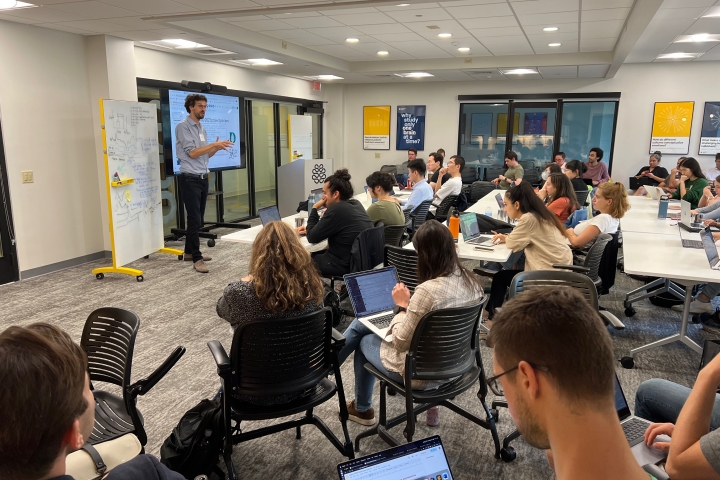The Methods in Neuroscience at Dartmouth summer school, aka MIND, addresses the growing need for cutting-edge computational training in neuroscience for graduate students, postdoctoral students, and even some junior faculty. Computational methods underlie some of the most exciting advances in brain sciences today, yet these tools are rarely taught in traditional programs.
Having recently wrapped up its fourth year, this unique initiative has consistently drawn worldwide attention, with hundreds of applicants for 25 training spots. The success of MIND isn’t just in numbers or accolades; it’s in the stories of the individuals behind its inception and evolution.
Four professors in the Department of Psychological and Brain Sciences who served as core organizers of the program this summer delve into what breathes life into MIND.
Luke Chang: The origins of MIND can be traced back to the hallways of Dartmouth, where Jeremy, Matt, and I would often find ourselves engrossed in conversations about the gaps in computational neuroscience training. Despite our varied research approaches, spanning social, cognitive, and systems neuroscience, we noticed a recurring theme: our students were thirsty for a specialized skill set that was hard to come by.
These discussions, layered with the shared passion to bridge the divide between disciplines and drive towards cutting-edge computational methods, led to the birth of MIND. Our goal was ambitious but clear: bring leading researchers from around the world to Hanover to shape a transformative training platform.
Jeremy Manning: What sets MIND apart for me are the hackathon-style “pop-up labs.” These lab groups form organically around students and faculty with shared goals and interests. The absence of traditional academic pressures offers a refreshing atmosphere, where experts around the world come to Dartmouth and collaborate freely on short-term high-risk, high-reward projects.
It’s a microcosm of how science should be—driven by undiluted curiosity, and unconstrained by rigid structures. Hanover’s charm is an important piece too; some of the best discussions and brainstorming sessions happen informally while surrounded by the Upper Valley’s natural beauty on canoe excursions and hikes, or even just wandering around campus, walking into town for an ice cream run, or sharing a meal in the dining hall.
Matthijs van der Meer: It’s incredible to see how ideas conceived in pop-up labs can evolve into so much more. The high-risk, high-reward nature of these projects often leads to innovations that may not have been possible within traditional research confines. An example of a MIND project I was involved in looked at whether a rat’s location along a track can be decoded from their brain recordings, using a model trained from a different rat.
We applied a neural decoding approach developed by some of the human neuroscientists at MIND to the rat’s brain recordings. We uncovered new insights into how rats represent their location that went against some of the dominant ideas at the time. Beyond just papers, the ripple effects of MIND are evident, with inspired attendees initiating similar programs elsewhere, thus expanding its impact even further.
Mark Thornton: My journey with MIND has been transformative. Just like many of my peers, I arrived at MIND eager to learn new computational approaches for studying the brain. What I found was not just knowledge, but community and purpose. Mornings filled with fascinating talks and afternoons dedicated to hands-on learning set the tone.
But the real magic was in the interactions—the passionate conversations, brainstorming sessions, and friendships that blossomed. MIND became a pivotal moment in my scientific journey, leading me from my first thrilling visit to Dartmouth as a MIND student, to returning as a pop-up lab leader, and eventually to joining the Dartmouth community and helping to organize the very training program that had made such an impact on my life. My story with MIND is not unique: it has been a turning point in so many other neuroscientists’ careers. This sentiment is also reflected in the feedback we’ve gotten from attendees. For example, here’s a sampling of some of the feedback we’ve received this year:
“MIND was one of the best things I’ve done in my PhD thus far, and many other attendees said the same. The formal training opportunities were excellent, but the general atmosphere of support and general goodwill made the experience special. The time outside of formal programming y’all took to eat breakfast, lunch, dinner, and ice cream with the attendees really set the tone for the two weeks.”
“I just want to say thank you so much for running such an amazing summer school. I’ve felt so inspired by everyone on the course and have loved your enthusiasm throughout.”
“Thank you once again for inviting me to such a wonderful experience; for the stimulating conversations; for the all-you-can-eat FoCo meals; for the lazy kayaking down the Connecticut; and most of all, for the opportunity to connect and create new science. These are memories I’ll cherish for the rest of my life.”
Chang, Manning, Thornton, and van der Meer: MIND is more than just a program to us; it’s a testament to what is possible when driven minds come together. As we conclude our fourth year, our vision for the future is expansive. We’re contemplating exciting avenues – from expanding our current structure to accommodate more trainees to envisioning an undergraduate-focused MIND. We’re also considering broader collaborations, be it through pre-conference workshops at prominent venues or through partnerships spanning various departments at Dartmouth and beyond. The journey so far has been exhilarating, and the road ahead promises even more. Here’s to pushing the boundaries of neuroscience and psychology at Dartmouth and setting new benchmarks in scientific training!
